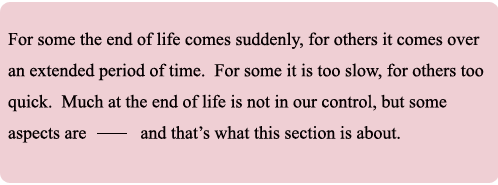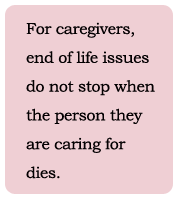
When there is time to prepare for end of life, elders and their families must make many medical, legal, and practical decisions —- and the choices about what to do can be difficult, intellectually and emotionally, for all involved. They confront new terms and kinds of care, such as comfort care palliative care, and hospice. Questions that usually arise in these circumstances, and some basic answers, follow.


Palliative care services are provided for people with life-limiting illnesses to relieve emotional and physical pain and suffering and to manage symptoms. It is not only for end of life situations. In addition to pain management, palliative care services may include assessing care needs, and provision of consultation, or supportive services to caregivers.

Hospice care services are provided for people with a terminal illness when life expectancy is limited, as determined by the patient's physician. There is no absolute rule linking admission to a hospice program to a specific number of days or months a terminally ill patient is expected to live. In general, a decision to admit someone to hospice services is based upon his or her degree of function and the diagnosis or diagnoses from which this person suffers. Many people (including some medical professionals) mistakenly think that to gain entrance to hospice, a person is expected to live less than six months. This is not true.
In reality, the "six-month rule" applies only to what is known of the behavior of a disease in general, and not to the person who has the disease. In many instances, people can be re-evaluated after the first six months and approved for continuing hospice care. In some unusual instances, care can continue for months or even longer. Periodic re-evaluations determine eligibility, under federal Medicare guidelines.
Hospices are skilled at making these decisions and explaining their work to patients and families, so it is always useful to meet and discuss possible hospice care with a representative of such a service.

Hospice care is provided in the home or at an extended care facility, such as a nursing home or assisted living center, or in some cases at a residential hospice.


They are accessible through private and non-profit hospice agencies and programs, home health or visiting nurse associations, group medical practices, hospitals and extended care facilities, such as nursing homes.


Medicare, Medicaid, health maintenance organizations and other private insurance plans cover the costs of hospice care in Massachusetts. Even if an elder has limited health insurance, many hospices will provide care on a sliding scale fee or at no cost for people without health insurance coverage. However, this does not cover room and board in skilled nursing facilities.

There are both public and private organizations that can provide information in depth on questions about hospice and palliative care in Massachusetts. You can contact the organizations serving your community through the resources listed below:
Massachusetts End of Life Commission —- The Commission assists elders and their families to address difficult end of life issues. It provides a comprehensive guide, in print and online, to end of life resources available in Massachusetts communities. The guide is searchable online by type of service, agency name or by region, with links to organizations providing end of life services and to a list of books on end of life issues. The End of Life Commission can also be reached by phone at 617-624-5424.
For online information, go to Mass. End of Life Commission. To search that website for types of service needed, navigate to> End of Life Services Resource Guide > Search by category:
 Alzheimer's/Dementia
Alzheimer's/Dementia
 Bereavement
Bereavement
 Complementary Health
Complementary Health
 Education
Education
 Financial
Financial
 Funeral Planning
Funeral Planning
 Home Support
Home Support
 Hospice
Hospice
 Information and Referral
Information and Referral
 Language/Interpreter Services/Cultural Competency
Language/Interpreter Services/Cultural Competency
 Legal
Legal
 Palliative Care
Palliative Care
 Respite Care
Respite Care
 Specialized Medical
Specialized Medical
 Support Group/Counseling
Support Group/Counseling
 Spirituality
Spirituality
 Transportation
Transportation
Massachusetts Compassionate Care Coalition (MCCC) is an organization of
Massachusetts organizations, agencies, institutions and individuals working to enhance care for persons with terminal illnesses. Its website provides links to end of life resources, such as hospice care, pain management and palliative care: Massachusetts Compassionate Care Coalition (MCCC). The Coalition is reachable by phone at 617-964-1692, or by email: info@massccc.org.
Central Massachusetts Partnership to Improve Care at the End of Life, a non-profit community coalition, educates about and promotes compassionate, informed and effective end-of-life care. Through their Better Ending initiative they provide the "Guide for a Better Ending," a booklet to help people plan in advance for serious illness. This booklet includes a health care proxy form and a personal wishes statement in English as well as multi-cultural versions for people of Spanish, Vietnamese, and African American descent. The Better Ending Initiative also provides two companion videos, "Conversations Before the Crisis" and "Better Ending Introduction," and audio versions of the guide in English and Spanish for the vision-impaired. The videos and guides can all be downloaded from the website: Better Ending Organization, or call 508-767-9877 to receive copies. 
Hospice & Palliative Care Federation of Massachusettsis a non-profit organization that promotes hospice and palliative care in the state through
 leadership, education and advocacy, technical assistance, support, and information to hospice providers, including professionals, families, and friends of individuals with life threatening conditions.
leadership, education and advocacy, technical assistance, support, and information to hospice providers, including professionals, families, and friends of individuals with life threatening conditions.
For a listing of hospice programs in Massachusetts by city and town, go to the home page MA Hospice > hospice locator. The Federation also distributes the Massachusetts Hospice Directory, to obtain call toll-free 800-962-2973, or 781-255-7077.
For further information on issues such as a health care proxy, see Legal Issues, Section 2, Part 2.


For caregivers, end of life issues do not stop when the person they are caring for dies. There are number of things that caregivers need to do right after the time of death which are of a practical nature, including getting a death certificate, finding a funeral home. For a helpful list of tasks to be attended to immediately following a death, go to End of Life Commission > End of Life Services Resource Guide > After Death Occurs check list.
Then caregivers move into a period of grief and their work becomes emotional rather than physical. Hospice agencies are one of the best resources and often provide bereavement support services and groups for those who have lost a close family member or friend, even if the person who died has not been a client of their hospice. The Hospice and Palliative Federation of Massachusetts listed above can help individuals access these services.
Other organizations that provide bereavement services and support groups include:
 Growth House, Inc.
Growth House, Inc.
 Griefnet
Griefnet
 Bereavement Magazine
Bereavement Magazine
 Compassionate Friends, for parents who have had children die, national office provides information on local groups. Call 630-990-0010, email: nationaloffice@compassionatefriends.org.
Compassionate Friends, for parents who have had children die, national office provides information on local groups. Call 630-990-0010, email: nationaloffice@compassionatefriends.org.

There are a number of organizations that focus on specific aspects of end of life care, from pain management to legal issues. The following may be particularly useful:
Americans for Better Care of the Dying is an organization dedicated to ensuring that all Americans can count on good end of life care. Their goals are to build momentum for reform, and explore new methods and systems for delivering care. They focus on improved pain management, better financial reimbursement systems, enhanced continuity of care, support for family caregivers, and changes in public policy, see Americans for Better Care of the Dying.
Compassionate Care ALS models compassion to those affected by ALS (Lou Gehrig's disease) by providing educational and legal resources, respite opportunities, instruction and guidance, subsidy of living aids and assistance, and intimate dialogue with patients and their caregivers, families, and friends. They have created a set of meditation exercises available in a CD set called "Cultivating Compassion" – it is geared to people with ALS but has relevance for people facing many other life threatening diseases. Go to: Compassionate Care ALS.
National Hospice and Palliative Care Organization (NHCPO) NHPCO runs Caring Connections, a program dedicated to building a national consumer engagement initiative to improve care at the end of life, supported by a grant from The Robert Wood Johnson Foundation.
Stop Pain is a program of the department of Pain Medicine and Palliative Care at the Beth Israel Medical Center in New York City. This site is particularly useful for caregivers. See Beth Israel-Stop Pain. Their integrative pain medicine website, Healing Chronic Pain informs the public on complementary treatments.


There are also many national organizations that provide excellent information on end of life issues. Here are a few and their websites will lead you to additional resources.

American Psychological Association (APA). This organization has a website —- APA Online Public Interest: End of Life Issues and Care — that has extensive information about psychosocial end of life concerns American Psychological Association.
National Cancer Institute (NCI) has a helpful fact sheet, "End of Life Questions and Answers" on the website: National Cancer Institute-End of Life Care.
AARP (American Association of Retired Persons) provides on its website extensive information on end of life as well as links to resources that address specific issues of law, healthcare, grief and loss. American Association of Retired Persons.

<< Health & Health Care | Caregiver Support: Resources & Services >>